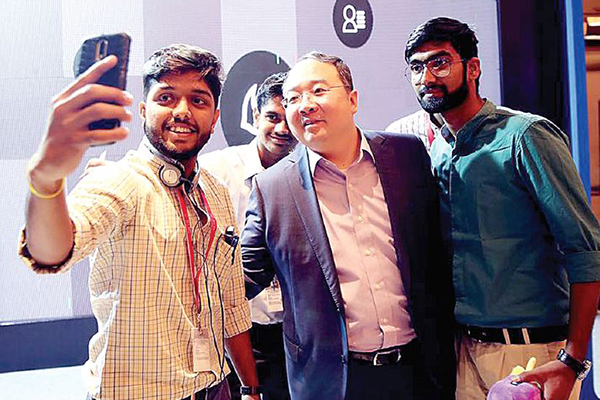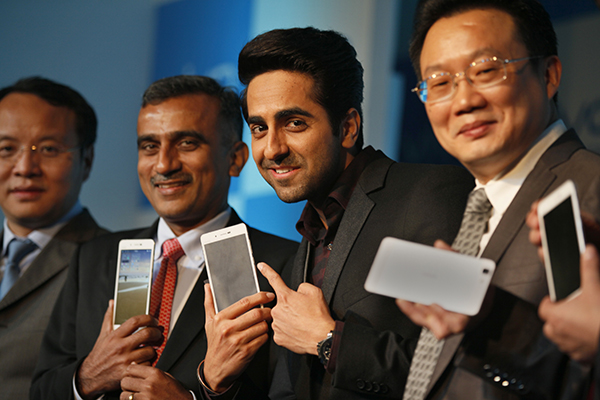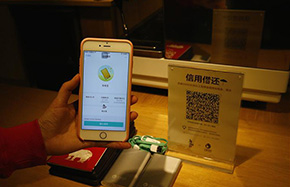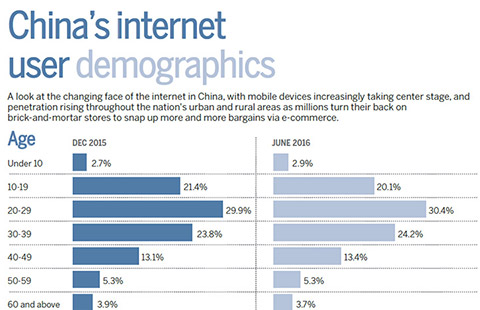Internet giants eyeing overseas markets
 |
|
Li Tao (middle, front row), CEO of Apus Group, enjoys a moment of happiness with Indian delegates at a forum in India on Nov 8, 2016. [Photo provided to China Daily] |
Saturated demand at home pushes them to invest more elsewhere, seeking better returns
Chinese entrepreneur Jiang Tianpeng was amazed to find out that owning a laptop computer in India may well be equal to owning a machine that can produce real cash.
In a recent seminar about Chinese internet companies going global, Jiang shared with guests a picture of an Indian man who makes a living by setting up his computer on the street and charging passersby for copying files or downloading music and videos from the computer to their own gadgets.
"Owning a laptop computer can still work as a means of production. This used to be a situation in China years ago, but now it is still a popular business in India. You can find these service providers in grocery markets, entrances of schools, or any places with lots of people, " said Jiang, the chief executive officer of Xender.
His startup company Xender developed an app that allows users to transfer and share files without an internet connection, a tool that may not have much demand in China nowadays, but enjoys great popularity in India, where people's thirst to get their hands on digital contents is challenged by poor mobile internet connections.
Xender is one of the growing number of Chinese internet companies which intend to carve out a place for themselves in overseas markets by leveraging the internet development gap between China and under-served regions outside China.
"When we look at the world's top 10 internet companies, six of them are from the United States and four from China, none of them from Europe or other Asia Pacific countries. In a way, this corroborates the fact that China is already a powerful internet country," Derek Shen, global vice president and China president of LinkedIn, the largest professional networking system headquartered in the United States, said to China Daily in a recent email interview.
 |
|
Bollywood actor Ayushmann Khurrana (center) poses with Shen Wei, group CEO of vivo Mobile, and Sudhanshu Vats, group CEO of Viacom18 at the launch of the world's slimmest smartphone-the Vivo X5Max in New Delhi, India. [Photo provided to China Daily] |
According to him, China's enormous local market, big enough to contain tremendous business opportunity, is one of the major reasons for the prosperity of internet companies in the country.
Fueled by the penetration of cheaper and cheaper smartphones, apps that are powered by the mobile internet have catered to an astoundingly wide variety of human needs, from shopping, ride and hailing to tickets booking.
Since 2011, China has been the largest mobile internet market in the world. In 2015, the number of internet users in China reached 710 million, which is 57 percent of its population and twice the entire population of the United States. But the rapid development of the internet industry in China is expected to reach its ceiling as the majority of the country's population are already mobile internet users.
Large enterprises like e-commerce giant Alibaba Group Holding Ltd and social networking leader Tencent Holdings Ltd and even startups, such as Xender, have started to set their eyes on markets outside China. India, which boasts the world's fastest-growing economy, emerges as an attractive, almost irresistible proposition for Chinese investors. India is one of the most popular destinations for Chinese tech investors, second only to the United States.
According to a report from itjuzi.com, a website dedicated to data on tech investments, In the first half of 2016, Chinese internet giants and venture capital firms invested more than 42.1 billion yuan ($6.26 billion) in 60 tech-related projects overseas.
Zhang Lei, founder of YeeCall, a Beijing-based startup that offers an instant messaging app in India, said that any entrepreneurs involved in an internet business would want to choose a market with a huge internet population.
"Mature internet markets, such as the United States and China, are big markets with well-established players. They are quite stable markets, but difficult places for late movers or small players to make big changes,"
"If you are betting on a big future, you need to choose a market with a huge potential for growing users and a strong momentum in business. So, India is the place to be in," said Zhang, whose one-year-old YeeCall claims it had more than 10 million users by the end of June, half of them in India.
"India and Southeast Asia are just like China five to 10 years ago," said Liao Yuanling, who works for 36Kr, a company that started its business in tech media and expanded its wings to venture capital investment and startup incubation.
"We think some of the startup companies there have big shots to grow into unicorn companies, that is, tech companies that are valued at $1 billion or more," she said.
India had about 300 million smartphones by the end of 2015, she added. The number is on track to undergo a fast growth till 2020 as the country has more than 1.2 billion people. Moreover, the average age of the India's population is about 27, which is about 10 years younger than China's.
A much younger population signals stronger desire to try out new technologies, said industry insiders. A recent report from Forrester Research Inc said metropolitan cities in India and China are progressive pioneers that lead the demand for new products and innovation in the Asia-Pacific region.
Li Tao, CEO of the Beijing-based Apus Group, which provides launchers, browsers and other apps for mobile phones running on the Android operating system, said that unlike people in the US and China who gradually made the transition from using personal computers to access the internet to using mobile devices, Indians don't need to go through the process. "They can directly jump into the era of the mobile internet," he said.
Founded in 2014, Apus Group expects to have 80 million users in India by the year-end. The company set up a venture capital fund in late 2015 with its partners. With an initial investment of 3 billion rupees ($45 million), the fund focuses on investing in Indian mobile internet startups.
Despite the spirited desire to test a big overseas market, the brutal fact is that India's poor financial infrastructure and the low per-capita income make it difficult to earn good returns on investment in the near term, said industry insiders.
Tang Cailin, product director of Baidu Inc's global business unit, said the online search giant has tried almost every method to make money in overseas markets. "The biggest problem is that less than 3 percent of our overseas users are willing to pay for the services or pay to download the products," he said, adding there is also the challenge of copyright infringement.
Jiang of Xender echoed by saying that it is very difficult to establish a feasible business model in India. "Most of the Chinese internet companies rely on online advertising to make money, but the poor internet connections in India make that not an ideal option there," he said.
"The good part is our company is still a small-sized company. Even if we cannot make big money, we can make ends meet. We are patient and we can wait for the springtime of the business to come," he said, adding that both setting up business and going global are long-term investment.
"Once you make a decision, you need to stick to it. Go big or go home," he said.























